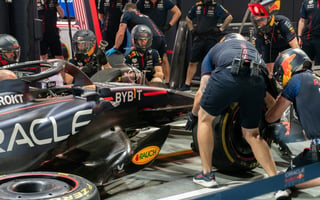What’s in your crisis communication plan?
Christian Horner described his sacking as the principal of Red Bull Racing as “a shock”.
But was it that much of a surprise for anyone else?
The Formula 1 powerhouse has seen its reputation hit the skids off the track over the past 18 months.
And performances on it have dipped.
Not got time to keep reading? Listen to the blog instead:
The team's parent company, Red Bull GmBH, has not given a reason or explanation for his sudden departure midway through the season.
It said in a vague statement: “Red Bull has released Christian Horner from his operational duties with effect from today.”
It added: “We would like to thank Christian Horner for his exceptional work over the last 20 years.
"With his tireless commitment, experience, expertise and innovative thinking, he has been instrumental in establishing Red Bull Racing as one of the most successful and attractive teams in Formula 1.”
But it is impossible to look at Horner’s hasty exit without returning to the crisis media management situation the brand found itself in 18 months ago. One that saw the team dominate mainstream media coverage and distracted from its race achievements.
And that made this job loss seem inevitable for many.
In February last year, it was announced that the sport’s longest-serving boss was being investigated for “inappropriate behaviour” with a female colleague.
And at one point during the crisis, a series of alleged messages between Mr Horner and the female colleague were leaked to the media and shared with the sport’s bosses.
Now, it is crucial to say that Horner has always denied the allegations and has twice been cleared by internal investigations.
But, from a crisis communication perspective, the scandal was poorly handled for such a well-oiled machine.
There was a lack of transparency and the open and honest communication that crises demand, with no details of the investigation released or the barrister who carried it out.
Horner carried on working during the investigation, turning up to car launches and test events. But the woman who made the allegations was suspended. This led to accusations of victim blaming and double standards - and questions about the treatment of women in the sport.
And there was a defensive tone, with Horner accusing rival Formula 1 bosses and the media of exploiting the situation.
He said: “The only reason this has gained so much attention is because of the leakage and the attention that there has been drawn in the media.
“Which has been very trying in many respects, particularly for my family because it has all been focussed very much in one direction.
“What has happened then after that is that others have looked to take advantage of it. F1 is a competitive business, and elements have looked to benefit from it, and that is perhaps the not-so-pretty side of our industry.”
It was a scandal that broke many crisis communication rules.
The team seemed determined to batten down the hatches and steer a way through.
But it seems that approach has left more than just a dented reputation.
Alongside the allegations never fully going away, results dipped.
Max Verstappen, the team’s star driver – and defending world champion – has won just twice in 12 races this year.
And the once dominant team is fourth in the constructors’ championship.
Those who follow the sport suggest the decline was accelerated by the departure of designer Adrian Newey, whose relationship with Horner is reported to have deteriorated after last year’s allegations.
Was the team prepared to put up with the reputational hit as long as it could continue to dominate on the track?
That may be a tricky question it could face as and when it opts to say more.
But in the meantime, the optics are far from ideal.
Horner’s departure after 20 years is seen as increasing the chances of the team retaining the services of its prize asset Verstappen – his influential father Jos has previously warned that Red Bull Racing would “explode” if the team principal kept his job.
He said last year: “The team is in danger of being torn apart.
“It can’t go on the way it is. It will explode. He is playing the victim when he is the one causing the problems.”
18 months later, that prediction feels pretty accurate, even if it turned out to be more slow-burning than explosive.
Whether it’s reputation damage, poor performance or fears about the future of its driver, Horner’s departure seems closely linked to the crisis.
Red Bull will hope the sacking puts an end to the decline.
But in the short term, it has reignited the media frenzy surrounding this story:
When we first wrote about the Red Bull crisis in March last year, we said there was “no chequered flag in sight.”
The finishing line may now have finally been reached.
But for Red Bull, the race to try and rebuild its reputation is only just beginning.
Media First are media and communications training specialists with nearly 40 years of experience.
We have a team of trainers, each with decades of experience working as journalists, presenters, communications coaches and media trainers.
Click here to find out more about our crisis communication training courses and crisis management testing.





